牛津译林版七下英语U2grammar2
- 格式:pptx
- 大小:82.90 KB
- 文档页数:6
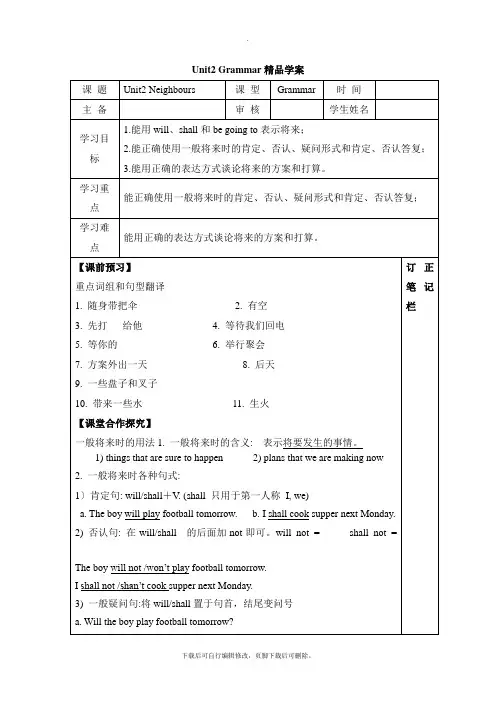
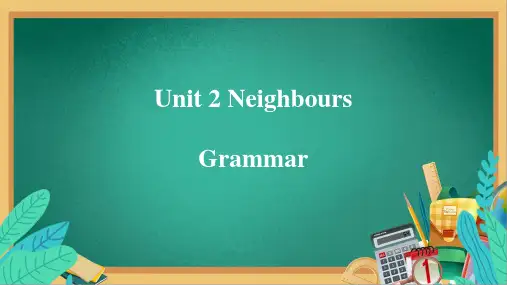
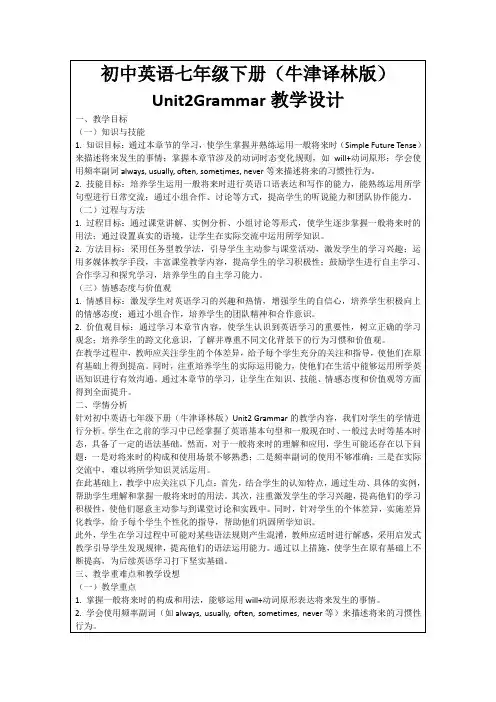
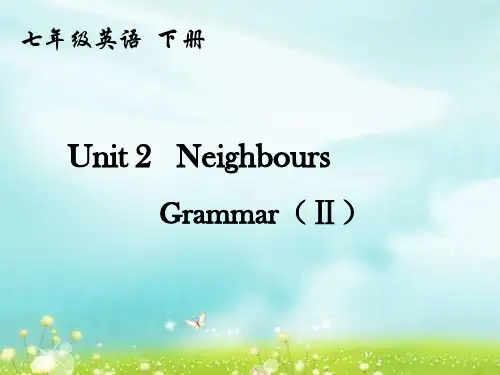
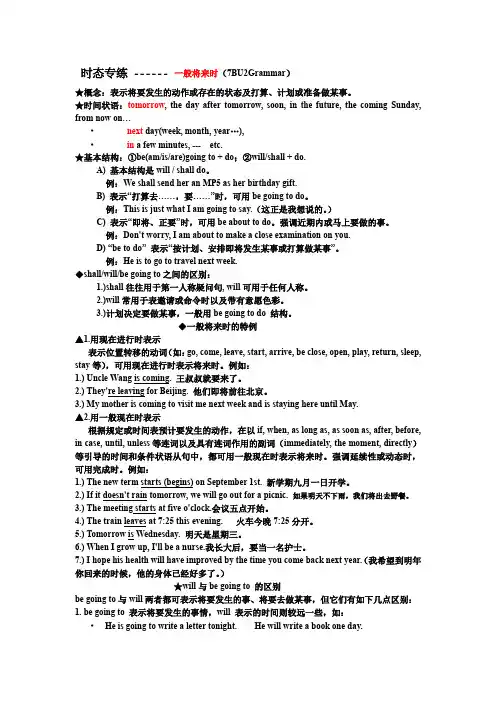
时态专练 ------ 一般将来时(7BU2Grammar)★概念:表示将要发生的动作或存在的状态及打算、计划或准备做某事。
★时间状语:tomorrow, the day after tomorrow, soon, in the future, the coming Sunday, from now on…•next day(week, month, year…),•in a few minutes, ---etc.★基本结构:①be(am/is/are)going to + do;②will/shall + do.A) 基本结构是will / shall do。
例:We shall send her an MP5 as her birthday gift.B) 表示“打算去……,要……”时,可用be going to do。
例:This is just what I am going to say.(这正是我想说的。
)C) 表示“即将、正要”时,可用be about to do。
强调近期内或马上要做的事。
例:Don't worry, I am about to make a close examination on you.D) “be to do” 表示“按计划、安排即将发生某事或打算做某事”。
例:He is to go to travel next week.◆shall/will/be going to之间的区别:1.)shall往往用于第一人称疑问句, will可用于任何人称。
2.)will常用于表邀请或命令时以及带有意愿色彩。
3.)计划决定要做某事,一般用be going to do 结构。
◆一般将来时的特例▲1.用现在进行时表示表示位置转移的动词(如:go, come, leave, start, arrive, be close, open, play, return, sleep, stay等),可用现在进行时表示将来时。
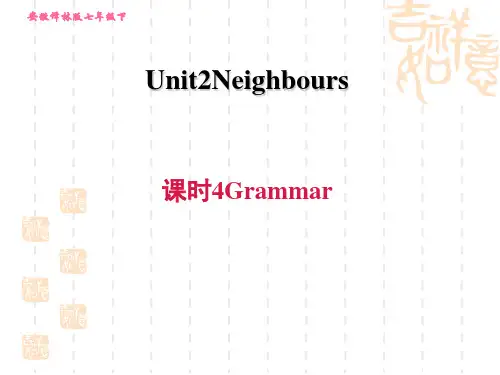
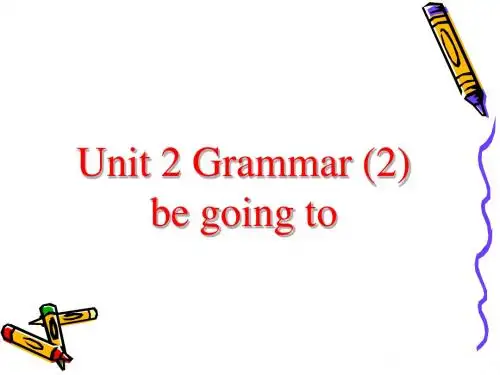
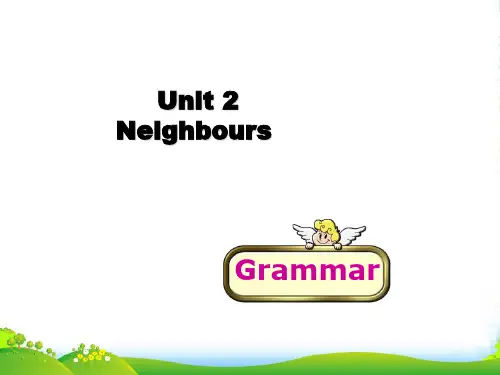
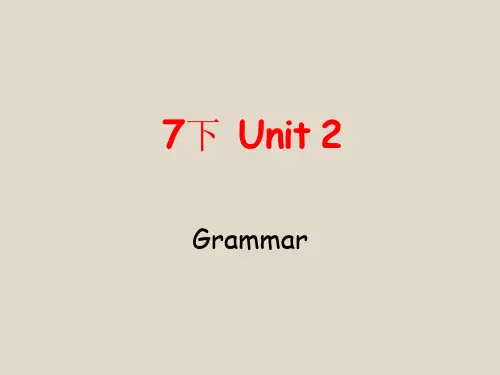
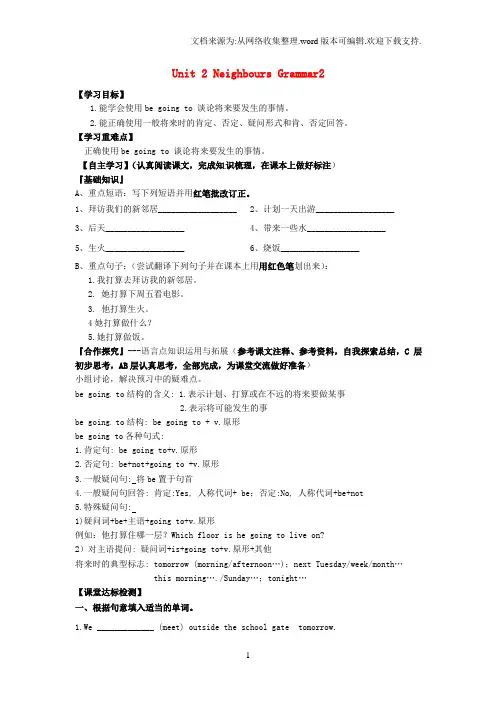
Unit 2 Neighbours Grammar2【学习目标】1.能学会使用be going to 谈论将来要发生的事情。
2.能正确使用一般将来时的肯定、否定、疑问形式和肯、否定回答。
【学习重难点】正确使用be going to 谈论将来要发生的事情。
【自主学习】(认真阅读课文,完成知识梳理,在课本上做好标注)『基础知识』A、重点短语:写下列短语并用红笔批改订正。
1、拜访我们的新邻居__________________2、计划一天出游__________________3、后天__________________4、带来一些水__________________5、生火__________________6、烧饭__________________B、重点句子:(尝试翻译下列句子并在课本上用用红色笔划出来):1.我打算去拜访我的新邻居。
2. 她打算下周五看电影。
3. 他打算生火。
4她打算做什么?5.她打算做饭。
『合作探究』---语言点知识运用与拓展(参考课文注释、参考资料,自我探索总结,C层初步思考,AB层认真思考,全部完成,为课堂交流做好准备)小组讨论,解决预习中的疑难点。
be going to结构的含义:1.表示计划、打算或在不远的将来要做某事2.表示将可能发生的事be going to结构: be going to + v.原形be going to各种句式:1.肯定句: be going to+v.原形2.否定句: be+not+going to +v.原形3.一般疑问句: 将be置于句首4.一般疑问句回答: 肯定:Yes, 人称代词+ be;否定:No, 人称代词+be+not5.特殊疑问句:1)疑问词+be+主语+going to+v.原形例如:他打算住哪一层?Which floor is he going to live on?2)对主语提问: 疑问词+is+going to+v.原形+其他将来时的典型标志: tomorrow (morning/afternoon…);next Tuesday/week/month…this morning…./Sunday…;tonight…【课堂达标检测】一、根据句意填入适当的单词。
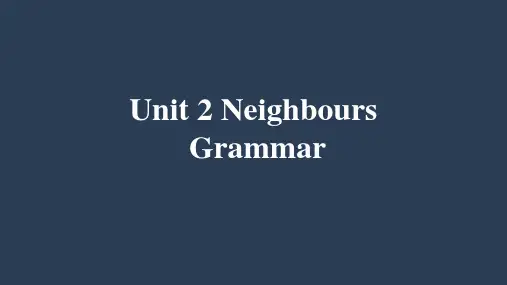
7B Unit 2 Grammar (II)编制人:审核人:班级姓名【学习目标】1、能用be going to 结构表示将来2、能正确使用be going to结构的肯定、否定、疑问形式和肯定、否定回答。
【精讲点拨】1.定义be going to 结构是一般将来时的一种形式,用来谈论即将发生的事情。
2.用法(1) 表示计划要做的事情。
如:①(我们打算下周去参观)the zoo next week.②What (打算干什么)when you grow up?(2) 表示很有可能即将发生的事情。
如:①There are so many black clouds in the sky. I think it (就要下雨了).②It is eight o’clock, we (要迟到了)。
3.基本结构be going to 后接动词原形,be随主语的人称和数的变化而变化。
(1)肯定句:主语+ ( , , ) + going to + 原形+…①I (将要去拜访)our new neighbours.②The mother with two children (将要飞往)to Beijing tomorrow.(2)否定句:在( , , )的后面+ .My mother is going to teach me how to cook meals tonight.(改为否定句)(3)一般疑问句:( , , )+主语+going to+ 原形+…肯定回答:Yes,主语+be 否定回答:No,主语+be notMy mother is going to teach me how to cook meals tonight.(改为一般疑问句,并作否定回答)?(4)特殊疑问句:疑问词+ ( , , ) +主语+ going to①My mother is going to teach me how to cook meals tonight.(对划线部分提问)②My mother is going to teach me how to cook meals tonight.(对划线部分提问)③My mother is going to teach me how to cook meals tonight.(对划线部分提问)4. 特别提醒There be 结构的一般将来时应为There is going to be…/ There are going to be...There (将有一场足球比赛)on TV this afternoon.. There (将有两场会议)in the school hall tomorrow. 【测评反馈】一.翻译下列短语。